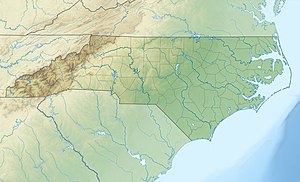Varnals Creek
Appearance
(Redirected from Varnals Creek (Haw River tributary))
| Varnals Creek Tributary to Haw River | |
|---|---|
| Location | |
| Country | United States |
| State | North Carolina |
| County | Alamance |
| Physical characteristics | |
| Source | divide between Varnals Creek and Rock Creek |
| • location | about 2 miles southeast of Rock Creek, North Carolina |
| • coordinates | 35°56′57″N 079°21′04″W / 35.94917°N 79.35111°W[1] |
| • elevation | 630 ft (190 m)[2] |
| Mouth | Haw River |
• location | about 4 miles south of Swepsonville, North Carolina |
• coordinates | 35°59′10″N 079°21′04″W / 35.98611°N 79.35111°W[1] |
• elevation | 449 ft (137 m)[1] |
| Length | 7.13 mi (11.47 km)[3] |
| Basin size | 11.83 square miles (30.6 km2)[4] |
| Discharge | |
| • location | Haw River |
| • average | 13.62 cu ft/s (0.386 m3/s) at mouth with Haw River[4] |
| Basin features | |
| Progression | Haw River → Cape Fear River → Atlantic Ocean |
| River system | Haw River |
| Tributaries | |
| • left | unnamed tributaries |
| • right | unnamed tributaries |
| Bridges | Walt Store Lane, Bass Mountain Road, Thompson Mill Road, NC 87, Preacher Holmes Road |
Varnals Creek is a 7.13 mi (11.47 km) long 3rd order tributary to the Haw River, in Alamance County, North Carolina.
Course
[edit]Varnals Creek rises in a pond about 2 miles southeast of Rock Creek in Alamance County, North Carolina and then flows northeast to the Haw River about 4 miles south of Swepsonville, North Carolina.[2]
Watershed
[edit]Varnals Creek drains 11.83 square miles (30.6 km2) of area, receives about 46.2 in/year of precipitation, and has a wetness index of 413.35 and is about 50% forested.[4]
See also
[edit]References
[edit]- ^ a b c "GNIS Detail - Varnals Creek". geonames.usgs.gov. US Geological Survey. Retrieved 4 October 2019.
- ^ a b "Big Alamance Creek Topo Map, Alamance County NC (Mebane Area)". TopoZone. Locality, LLC. Retrieved 4 October 2019.
- ^ "ArcGIS Web Application". epa.maps.arcgis.com. US EPA. Retrieved 4 October 2019.
- ^ a b c "Varnals Creek Watershed Report". Waters Geoviewer. US EPA. Retrieved 4 October 2019.


